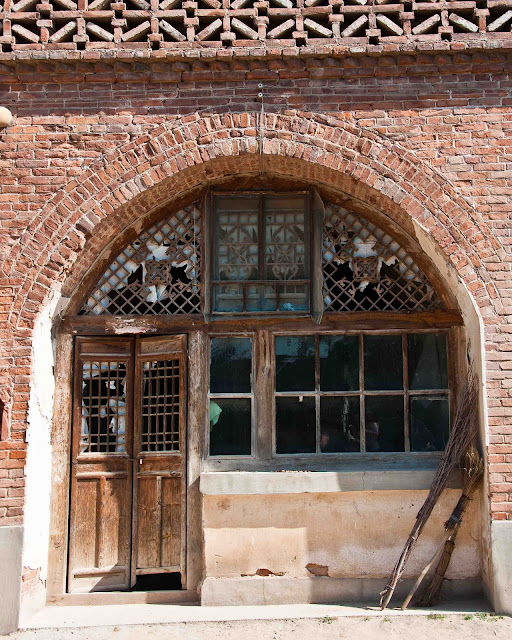 We rely a lot on the
kindness of farmers.
We rely a lot on the
kindness of farmers.
Every night when we set up camp it's either on farmland or
very close to it, given that every square inch of flat land in China is given over to agriculture including road verges, spare pocket handkerchiefs of land between fences and homes, and tiny slips of land beside bridges and waterways. The skerricks of land that are left over are too steep to farm but also too steep to park on, causing us all to roll forwards under the dashboard during the night, like slow-rolling stones.
When the farmers are about we ask if we can camp, and when they're not we choose a quiet site away from farmhouses so we stay out of the way of daily farm
business, allowing the farmers to go about their work without any disruption
from us.
At times though, we
accidentally cause a lot of disruption to daily farm business. Some afternoons
shepherds bring their flocks of sheep or goats home past our van and we suddenly realize we have parked right in their path. No wonder the grass was so flat and short! But they just move quietly around
us without any bother.
Other times we park in what we consider a remote spot only to discover the next morning we are directly next to a 'tractor highway' as all the local farmers drive their tractors to work out in the fields. Did you know farmers start work at 4.30am? Neither did I until the deafening two-stroke engines rolling past had me leaping out of bed in the dark.
善良的农民给我们很大的帮助。我们每晚都在农田或是离农田很近的地方搭帐篷。因而我们总是留意在远离农民日常活动的地方以避免自己打扰他们的工作。
随着时间一天天过去,我们实际上对农民的日常活动多有打扰。有些午后,牧羊人带着他们成群的羊儿回家时经过房车,我们就意识到我们正好停在他们回家的路上,但是他们只是安静地绕过我们,没有任何声音。
还有时我们会停在一处我们觉得比较远的地方,而第二天早晨却发现我们正好停在“拖拉机专用道”的旁边,因为当地的农民开着拖拉机去田里工作。你知道农民是早上4点半开始工作吗?我反正不知道。
This week we set up
camp near a tiny village in western Shanxi Province and parked amongst tall
wildflowers next to a field of corn. The village consisted almost entirely of yaodong - cave homes. I've been fascinated by these homes for several years, but the closest I'd ever come to seeing inside one was when I visited an abandoned cave house village outside Xi'an.
These extraordinary homes are the most common form of dwelling in this part of China - almost everyone lives in one. They are not naturally occuring caves, like those inhabited by the papermakers of Guizhou, but are man-made arched caverns dug into the compacted dirt hills of the region. They're cool in summer, warm in winter, and have the advantage of not occupying any precious terraced land used for farming.

We thought we were far enough from
the village that the noise of our generator wouldn't bother anyone, but what we
hadn't counted on was how curious those local farmers were about us.
Perhaps they had never met foreigners before. Certainly they had never seen a fangche before. In their ones and twos, then in their tens they all came to say hello, ask a lot of questions, look inside the van, and watch us cook and eat dinner. Babies, small children, teenagers, parents and grandparents - all came. I imagine not a lot of work got done in the village that evening.
这个星期我们在山西省西部的一个小村庄安营,我们挨着一片向日葵田停下,停在一片长势颇高的野花中。我们觉得已经停得够远了,发电机的声音不会吵到任何人,但我们没有预计到当地农民对我们的好奇心。
也许他们以前从来没见过外国人。他们一定从未看见过房车。他们一两个,三五个然后十几个地过来和我们打招呼,提很多问题,走进房车看看,观看我们做晚饭和吃晚饭。婴儿,小孩,少年,父母和祖父母——都来了。我猜那晚整个村庄都没完成什么工作。
 The next day, at their
repeated invitation, we visited their yaodong cave homes. The village had all
stopped work and downed tools for our visit, waiting for us under the great big
walnut tree at the entrance to the village.
The next day, at their
repeated invitation, we visited their yaodong cave homes. The village had all
stopped work and downed tools for our visit, waiting for us under the great big
walnut tree at the entrance to the village.
第二天,在他们的盛情邀请下,我们参观了他们的窑洞。整个村庄早上都没有工作,人们站在大胡桃树下看着我们。
Yaodong have a natural, simple beauty. Each one is fronted by three graceful arched doorways with inset windows decorated with fretwork and decorative brickwork. Inside, the yaodong are light and surprisingly airy, with light reflecting from the curved ceiling of plaster-covered rammed earth.
The rooms are all furnished simply with a kang - a large earthen platform bed with a chimney underneath for heat during the cold, harsh winter months - a small stove, a cupboard and sofa, and framed photographs on the walls of their families, some far away. The first two
arched rooms are for living, and the third used to store grain and preserved
foods.
他们带领我们参观许多不同的窑洞——尽管外面很炎热,但是窑洞里面都很凉快舒服。窑洞有三个连在一起的拱门,有门和窗户,许多都装饰有浮雕纹饰和装饰性的砖块。窑洞的家具都很简单,里面有一个炕和火炉,一个小碗柜和沙发,墙上挂着农民们的先辈们的照片。第一二个窑洞是居住用的,第三个窑洞是用来存放谷物和储存食物的.
The farmers were so
pleased to have us as visitors, and so proud to show us their wonderful neat houses. It's a great privilege it is to be welcomed into someone's home as a stranger, let alone the homes of an entire village.
农民们非常高兴我们能去参观,也非常自豪地给我们展示他们的房子。作为答谢,我用偏光板给村子里的人照了全家福。当第一张照片慢慢成像,显出颜色阴影,然后轮廓,最后是脸庞和细节时,四周的人们觉得太不可思议了。有些村民为了照相还冲回家更换衣服,梳理头发。
As a way
of saying thank you I took polaroid photographs of everyone in the village. At first there was some confusion about the strange white toy camera that spat out a white card, then amazement all round as the first photograph
slowly developed, revealing first coloured shadows, then forms, and finally
faces and details.
Several spent some minutes staring intently at the black side of the photograph before realizing the image had already fully formed on the reverse. Several others rushed away to change their clothes and smooth their
hair for their portraits.
Already so generous in taking us into their homes, as we left the farmers filled our hands and pockets with
pears, walnuts and corn they had grown themselves.
In our travels we've now met so many
kind and open people living and working in the countryside. This post is a
tribute to all of them - I know they will never see it or read it, but I thank
them anyway.
他们是如此的慷慨大方,我们离开时,他们在我们手上和口袋里塞满了自家种的梨、胡桃和玉米。在我们的旅程中,我结识了那么多居住在农村的热心可爱的人们。我将这篇文章献给他们——我知道他们永远也不会看到,但我还是要感谢他们。
Labels: China, China road trip, farms, travel
 We rely a lot on the
kindness of farmers.
We rely a lot on the
kindness of farmers. 
















